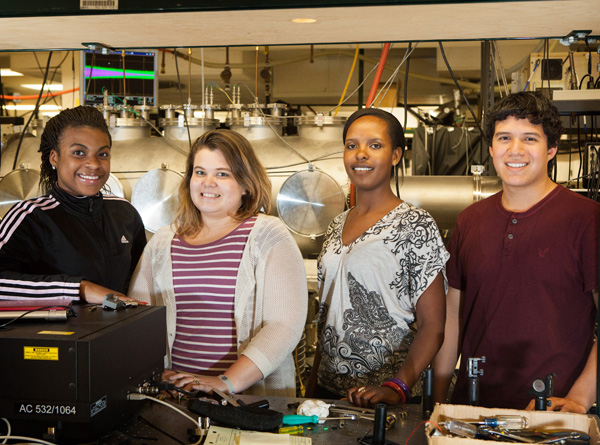“They told us that there have been astrochemists who work their whole life and never find new molecules, and we did this in our first experiment of the summer,” said David Vasquez, a student in the Virginia-North Carolina Alliance for Minority Participation, based at the University of Virginia.
Vasquez, a biochemistry student at Virginia Tech, attended the alliance’s summer research program at U.Va. this year and was one of four students on a team that discovered a new interstellar molecule, called cyanomethanimine.
That kind of experience demonstrates the alliance’s success and led the National Science Foundation to recently award the program a second five-year grant for $3.5 million.
U.Va. initiated and leads the alliance, a multiple-school consortium whose goal is to increase the quantity and quality of underrepresented minority students who pursue degrees and careers in science, technology, engineering and mathematics – collectively known as the “STEM” fields.
The VA-NC Alliance, comprising eight colleges and universities in its first phase of five years, recently added Piedmont Virginia Community College to its group. Along with U.Va., the seven original partner schools are Bennett College for Women in Greensboro, N.C.; Elizabeth City State University in the N.C. system; George Mason University in Fairfax; Johnson C. Smith University in Charlotte, N.C.; St. Augustine’s University in Raleigh, N.C.; Virginia Commonwealth University in Richmond and Virginia Tech in Blacksburg.
Kristin Morgan, U.Va.’s program director, provided data from the first five years that shows progress: The total number of underrepresented minority students graduating from VA-NC Alliance partner institutions with STEM degrees increased by 67 percent, from 488 to 815. The number of Hispanic/Latino students who obtained STEM degrees almost doubled in five years, from 124 to 238.
During the same time period, minority student enrollment in STEM subjects at the allied schools rose from 3,469 to 4,837, a 39 percent increase. The number of underrepresented minority students in STEM fields who participated in alliance activities – including symposia, tutoring, professional conferences, summer research programs and graduate school preparation meetings – increased by 93 percent, from 911 to 1,763.
The National Science Foundation provides funding to the VA-NC Alliance through its national Louis Stokes Alliances for Minority Participation program. There are currently more than 40 alliances nationwide. The NSF grants are awarded for three levels: new, mid-level and senior.
In the mid-level phase, the VA-NC Alliance has several goals, Morgan said.
“Our goals for the mid-level phase include boosting the enrollment of underrepresented minority students in STEM subjects by 60 percent. The baseline from year four was 4,244, so the goal is 6,790,” she said. “We also propose a 60 percent increase in the number of underrepresented minority students in STEM receiving their baccalaureate degrees, from 641 in 2011 to 1,026 in the next five years.
“A third goal is to surpass the national average of underrepresented minority students entering STEM graduate degree programs,” Morgan added.
Each of the institutions in the VA-NC Alliance offers individually tailored recruitment, retention and enhancement activities to support their students. These activities include annual symposia, bridge programs, stipends, tutoring, mentoring, research programs, workshops, faculty exchanges, opportunities for professionalization in the disciplines and U.Va.’s annual summer research program, created specifically for alliance students. A program such as this enables students from the smaller institutions to visit a major research university and to conduct hands-on research in state-of-the art laboratories.
“A hallmark of the proposal to NSF was the VA-NC Alliance Summer Research Program that for the past three years has brought underrepresented minority students to U.Va. for interdisciplinary and collaborative research experience,” said Dr. Marcus Martin, U.Va.’s vice president and chief officer for diversity and equity, who oversees the project and heads the management team.
The summer research program is an intensive eight-week session during which students work with either the Center for Chemistry of the Universe or the School of Engineering and Applied Science’s Department of Systems and Information Engineering.
The students who found the new molecule, for example, conducted experiments in the astrochemistry lab of Brooks Pate, a chemistry professor in U.Va.’s College of Arts & Sciences, and used data from the National Radio Astronomy Observatory’s Green Bank Telescope in Green Bank, W.Va., to verify their finding.
In addition to support from NRAO, the Va.-N.C. Alliance and the Department of Chemistry, the students were supported by a grant from the Jefferson Trust.
The diversity and equity office co-sponsors the alliance program with the University's Center for Diversity in Engineering. The center’s director, Carolyn Vallas, assistant dean for diversity, and Linda Columbus, assistant professor of chemistry and of molecular physiology and biological physics, fill out U.Va.’s alliance team.
Vallas said the VA-NC alliance is successful due to the devoted mentors and advisers who work “day-in and day-out” with the students.
“These persons motivate, encourage and provide guidance for alliance students, so that they can successfully pursue their dreams of becoming a future STEM professional,” she said.
Morgan lauded the collaboration between the partners, their commitment to the common goal of graduating more underrepresented minorities in the STEM fields, and “the creativity it takes to develop new research opportunities and pathways for students’ professional development.”
In the future, with the third phase in mind, the alliance intends to gain commitments from corporate partners and its nine colleges and universities in order to sustain progress beyond the NSF grant, Morgan said.
“This is important work, and the stakes are high,” Martin said. “The United States is falling behind other nations in the number of men and women earning college degrees, especially those who receive training in the STEM fields. The alliance is creating opportunities by helping students earn degrees in these fields while building strength for the nation.”
Media Contact
Article Information
October 9, 2012
/content/success-va-nc-alliance-minority-participation-leads-continued-funding

